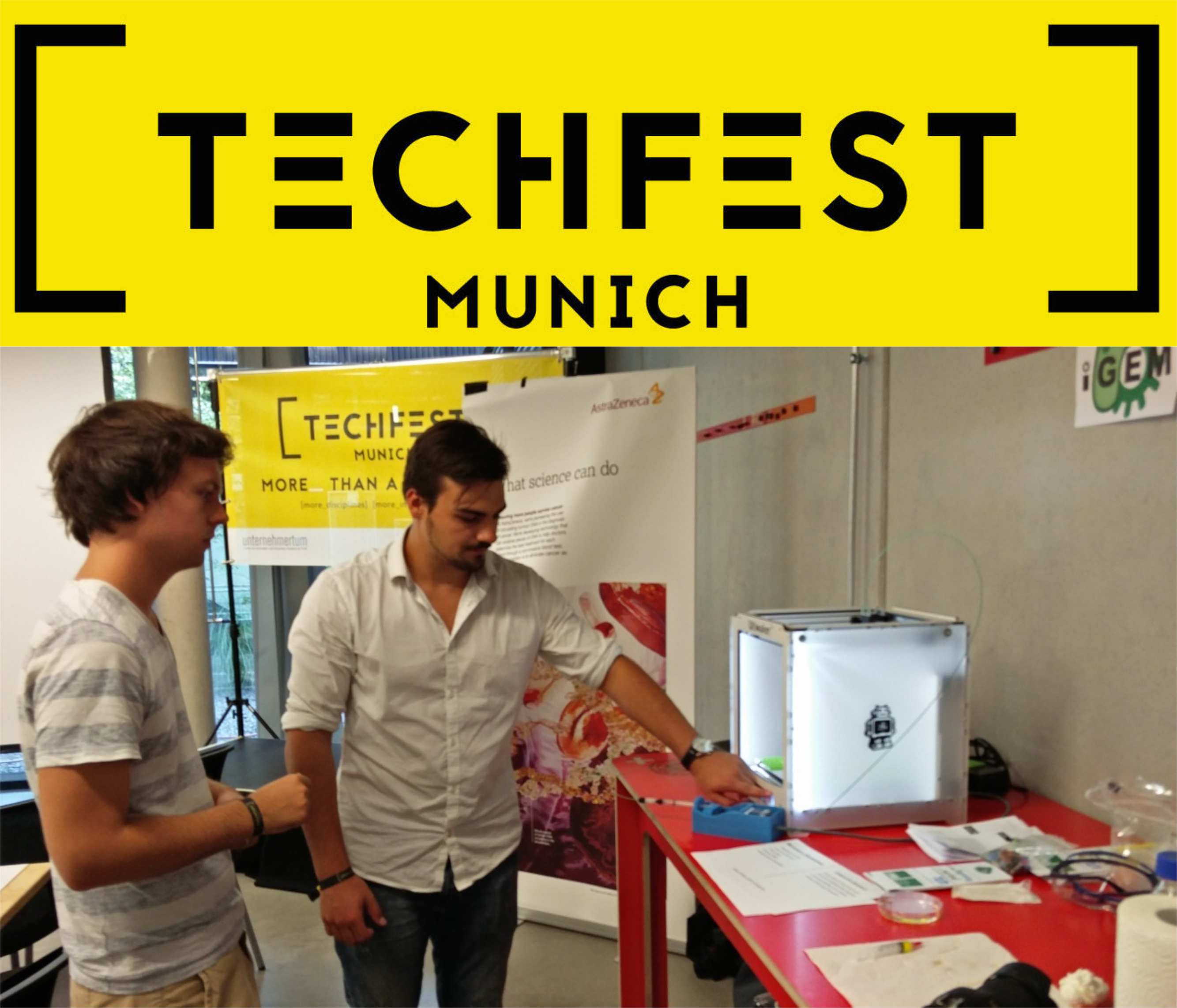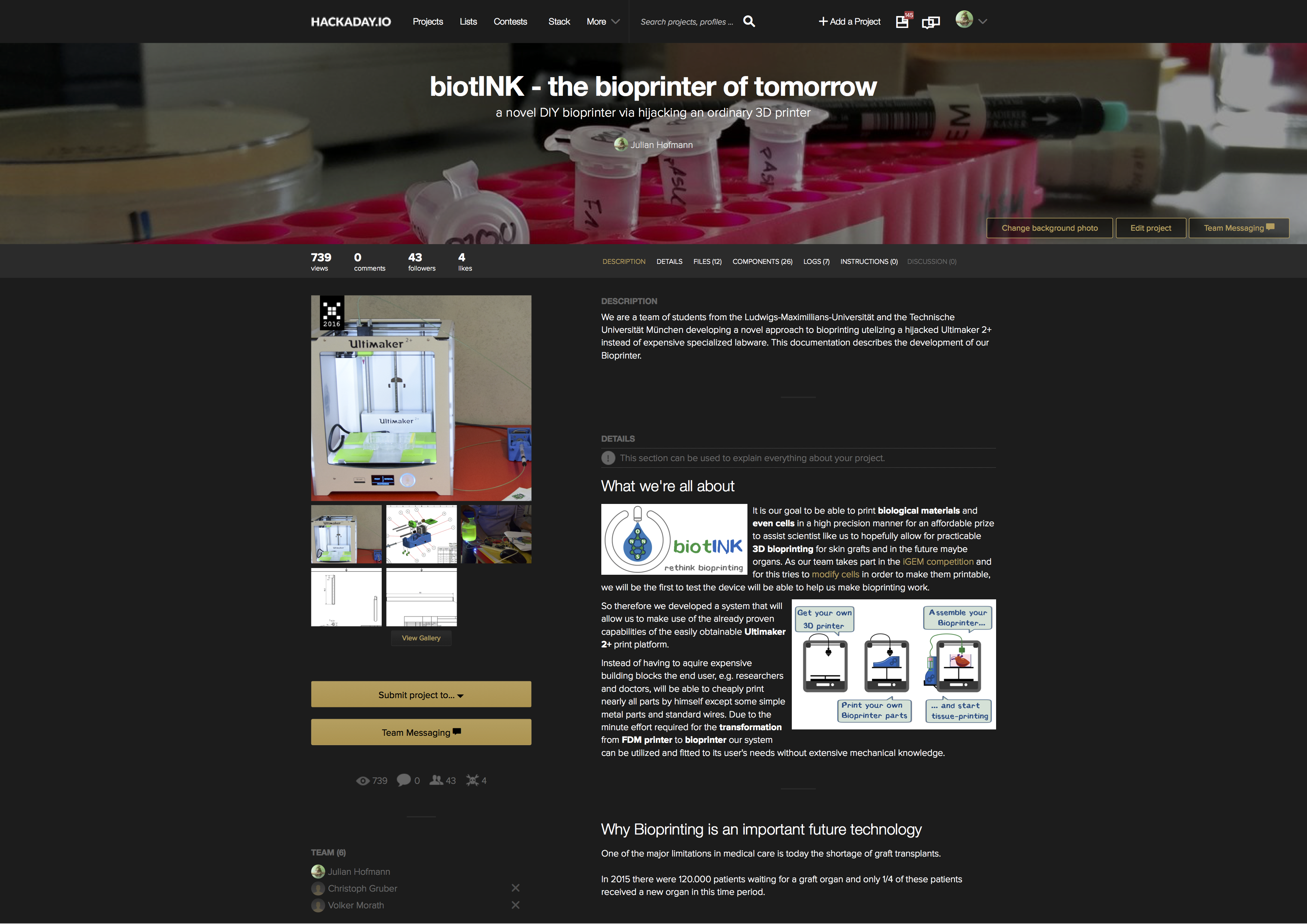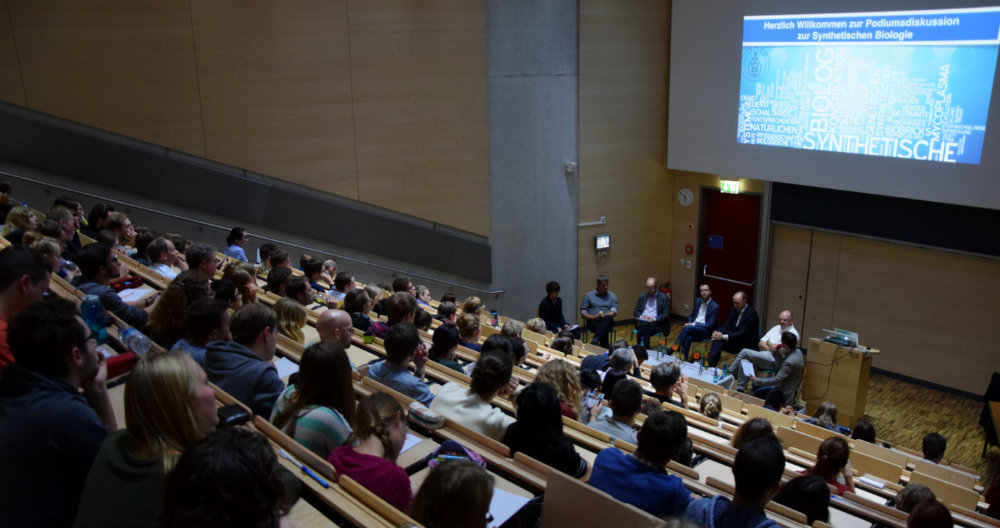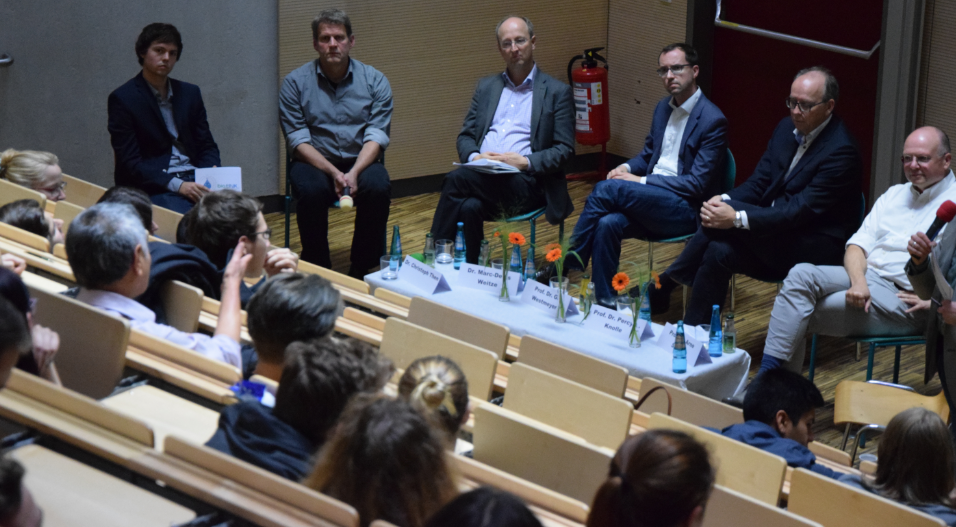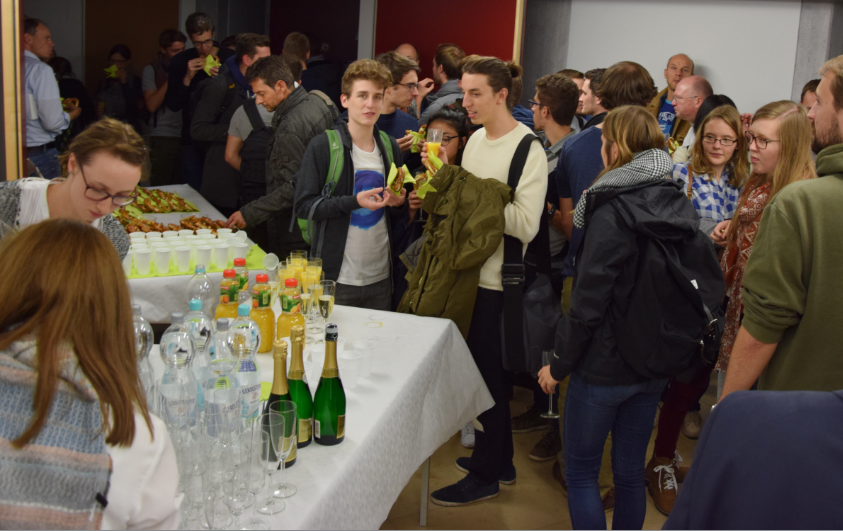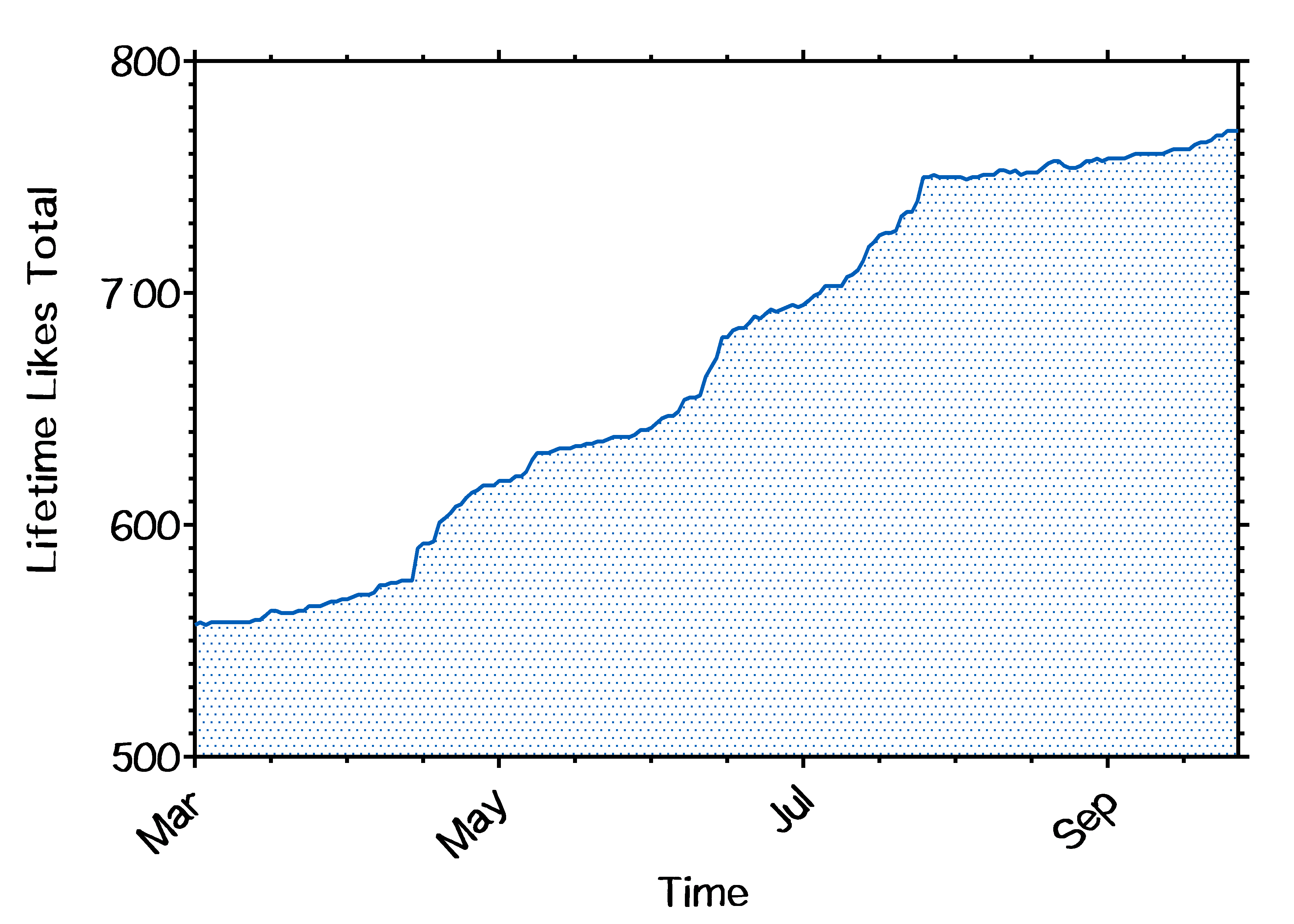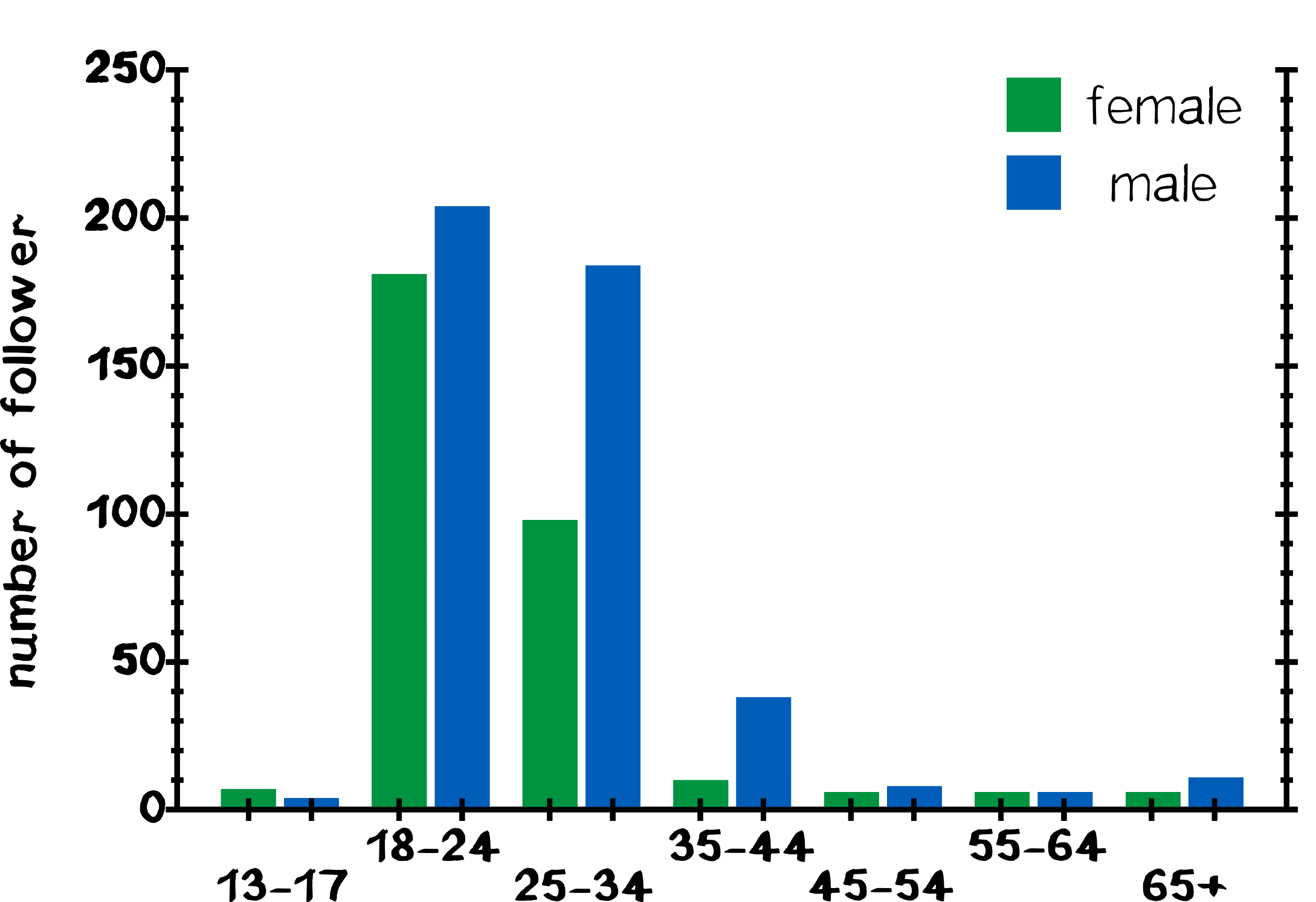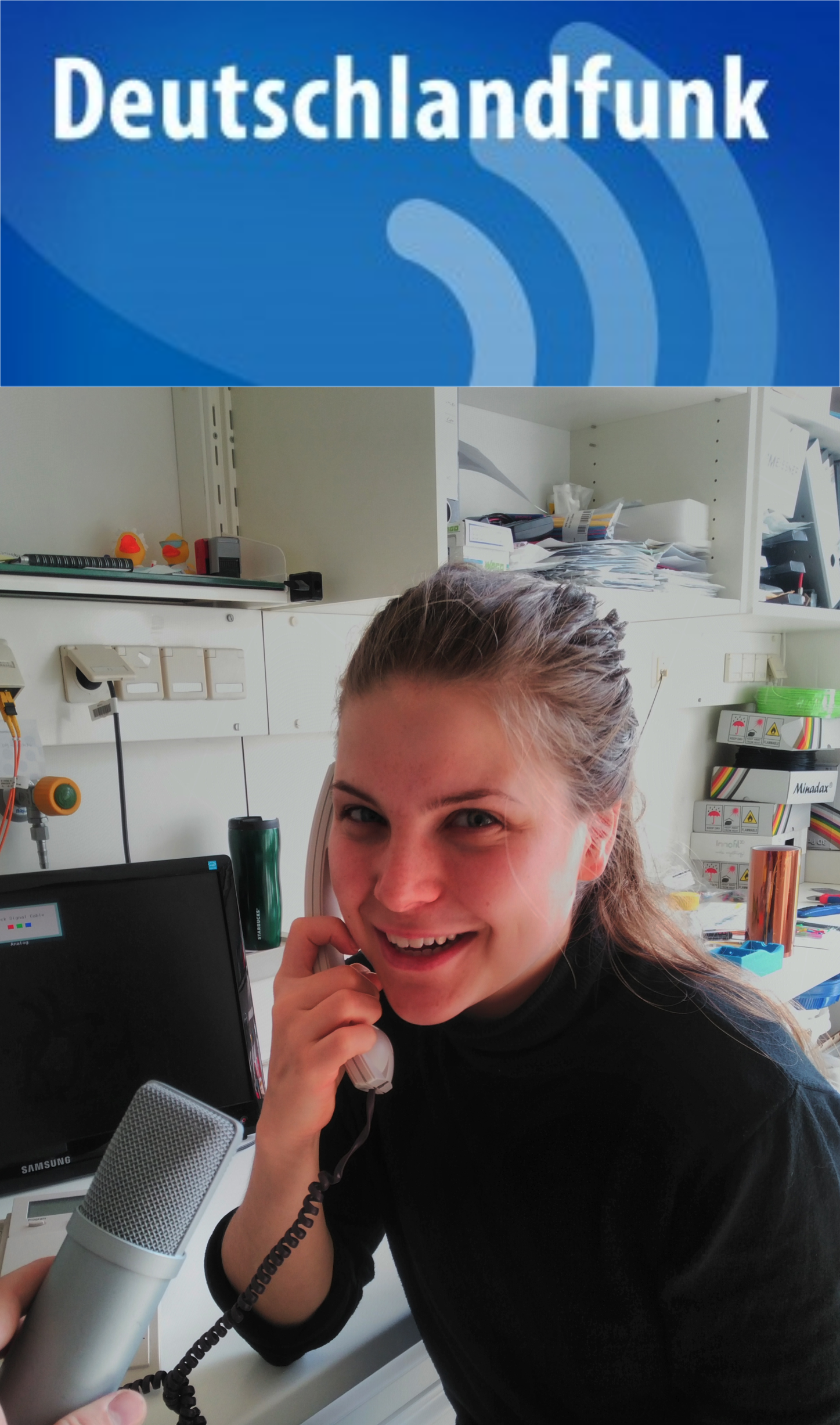(→Panel discussion) |
(→Hackaday - the largest community of hackers) |
||
| Line 18: | Line 18: | ||
==Hackaday - the largest community of hackers== | ==Hackaday - the largest community of hackers== | ||
| − | <div class="white-box">[[File:Muc16_Hackaday.png|thumb|right|300px|link=http://hackaday.io/project/14501-biotink-the-bioprinter-of-tomorrow|"biotINK" project page in hackaday.io]]As hacking of our 3D printer became an essential part of our project we figured we needed to share our know-how in the true spirit of the DIY community. So it came with no suprise that we put our project up on [http://hackaday.io hackaday.io], the world's largest collaborative hardware development community. This also allowed us to introduce this highly tech-loving audience to our kind of hacking, biohacking. | + | <div class="white-box">[[File:Muc16_Hackaday.png|thumb|right|300px|link=http://hackaday.io/project/14501-biotink-the-bioprinter-of-tomorrow|"biotINK" project page in hackaday.io]] |
| + | As hacking of our 3D printer became an essential part of our project we figured we needed to share our know-how in the true spirit of the DIY community. So it came with no suprise that we put our project up on [http://hackaday.io hackaday.io], the world's largest collaborative hardware development community. This also allowed us to introduce this highly tech-loving audience to our kind of hacking, biohacking. | ||
[http://hackaday.io/project/14501-biotink-the-bioprinter-of-tomorrow Our project page] allows everybody how might want, be it a scientist oder rocket engineer, to reconstruct our bioprinter with the DIY kit as all the files and instructions one needs are hosted there and can be accessed for free. | [http://hackaday.io/project/14501-biotink-the-bioprinter-of-tomorrow Our project page] allows everybody how might want, be it a scientist oder rocket engineer, to reconstruct our bioprinter with the DIY kit as all the files and instructions one needs are hosted there and can be accessed for free. | ||
</div> | </div> | ||
| − | |||
==OPEN DAY== | ==OPEN DAY== | ||
Revision as of 12:45, 18 October 2016
Educational Engagement
Introduction
Our team did recognize the big responsibility and importance to teach and inspire students, who are interested in biology topics like syntheic biology, genetic engineering or cloning. Teachers may don’t have the opportunity and the time to be responsive to all questions in the lessons. So we created an smart board file, which teaches these topics in an interactive way and which could be used in additional periods. The short video gives you an impression of the slides we did preapre.
Why did we create a smart board file instead of a powerpoint presentation?
Over the last years smart boards have become more popular in schools all over the world. They replace the traditional overhead projector everyone knows because of its tedious work of compiling tranperencies for every new topic or lesson. Powerpoint presentations often don’t allow pupils to get interactive in the hole lesson. They oftentimes have to keep still and have to pay attention to the slides, which the teacher did create. Smart boards allow the inclusion of different forms of media like photos, videos or graphs, which can be also added spontaneously in the period by the teacher. This novel technology supports differents learing methods. Pupils profit by learning in a visiual way or audio parts like discussions with the teacher. Every student has the possibilry to create the lesson and to contribute some ideas for individual entries. On the top smart boards are easy to handle because you only need to install a software to open your files. Specifc marker pens, chalk oder cleaning fluids are not necessary any more. With an access to the internet teachers have the possibility to gain more material for their lessons in few seconds.
For that reason we created a smart board file in close collaboration with a teacher, which meets the needs of pupils and supports their learning achievement in an ideal way. We want to provide our smart board file to download and hope to spread throughout the knowledge of synthetic biology in classrooms all over the world.
Public engagement
TECHFEST MUNICH
Hackaday - the largest community of hackers
As hacking of our 3D printer became an essential part of our project we figured we needed to share our know-how in the true spirit of the DIY community. So it came with no suprise that we put our project up on [http://hackaday.io hackaday.io], the world's largest collaborative hardware development community. This also allowed us to introduce this highly tech-loving audience to our kind of hacking, biohacking. [http://hackaday.io/project/14501-biotink-the-bioprinter-of-tomorrow Our project page] allows everybody how might want, be it a scientist oder rocket engineer, to reconstruct our bioprinter with the DIY kit as all the files and instructions one needs are hosted there and can be accessed for free.
OPEN DAY
EF schreibt heute was dazu
Panel discussion
We made it possible to give citizens the chance to get a deep insight into our project and fields syntheic biology deals with. Our intention was also to discuss and explain sensitive catchwords like „designer babys“, „genetically modified food“, or „gene therapy“.
Prof. Dr. Gil Westmeyer (principal investigator of molecular neuroimaging at the IBMI) gave an introduction into synthetic biology. Mr Westmeyer described the fields and the methods of synthetic biology but he also gave a great impression to future possibilities.
The panel dicussion was moderated by two iGEM members, Christoph Gruber (Molecular Biotechnology, Master) and Enes Ugur (Biochemistry, Master). We invited highly regarded scientists and leaders of research centers to talk about different aspects of synthetic biology. We asked them some questions, which deals with topics like applications of synthetic biology, safety and risks or ethic and society.
At the end, we enabled the participants to ask the experts directly their qustions but they had also the chance to explain their opinions and feeling, which come up with synthetic biology.
There is a list of the academics who support the panel discussion with their great knowledge and different views:
- Prof. Dr. Percy A. Knolle: leader of the Institue of Molecular Immunology and Experimental Oncology at the medical center „Klinikum Rechts der Isar“
- Prof. Dr. Arne Skerra: owner of the chair Biological Chemistry at the TU Munich and company founder
- Dr. Christoph Then: manager of Testbiotech and graduated veterinarian
- Dr. Marc-Denis Weitze: leader of the thematic focus technic communication at the academy „Deutsche Akademie der Technikwissenschaften“
- Prof. Dr. Gil Westmeyer: owner of the chair Biological Imaging at the TU Munich and leader of a junior group „ Helmholtz Zentrum München“
We provided the oppotunity for a convival evening with food and drinks following the discussion.
Social Media
Follow @iGEM_TUM
Tweet to @iGEM_TUM
Tweets by iGEM_TUM
Reach and demographics
As nowadays social media represents an easy-access information hub for a major fraction of the public it is of key-value to make use of it in order to inform about and decrease public distrust towards the field of Synthetic Biology and genetic engineering in general.
Thus we consider it important to determine the achieved reach and analyze the audience that can be attained. This not only indicates the current public interest in the topic but also which demographic groups can not be reached by the means of social media. Our analysis was based on the world's most accessed social media service Facebook and looks at the developments of our team page over the course of several months.
As displayed in Figure 1 a small direct increase in audience numbers over the first several weeks can be observed shortly after the initiation of this years project. It is to assume that the majority of this increase is caused by team members and their respective pear group and family. At the beginning of May a sudden rapid increase was observed as direct consequence of our first posts and especially our visit to the "analytica 2016", the International Trade Fair for Laboratory Technology, Analysis and Biotechnology.
The weeks following showed a continued rise in numbers with another major boost at the beginning of Juli as a results of our attendance at the European Experience in Paris.
With the time to the Jamboree decreasing the growth rate became lower though still consistent. A possible explanation for this phenomenon is the theory that up to this point most members of fellow teams have contributed to the growth and a maximum was reached. This would propose that the continued growth is mostly caused by people that are not associated with the team or iGEM itself. Further data from other team pages would be necessary to compare developments and further investigate the possibilties in order to allow for increased public recognition of iGEM projects.
As mentioned above we also analyzed our target group which is displayed in Figure 2. Mostly striking is the observation that the vast majority of followers is included in the age range of 18 to 34 years which correlates clearly to age iGEM participants. Increased attention to the mid-aged population sector should be included in future efforts to achieve a more greater and more diverse audience in order to fully engage with the majority of the public. Furthermore a slight excess of male followers can be noted though this may just be a consequence of the overall Facebook user demographics. Nonetheless gender equal targeting should be seen as a goal.
Media Coverage
National radio - Deutschlandfunk
References


